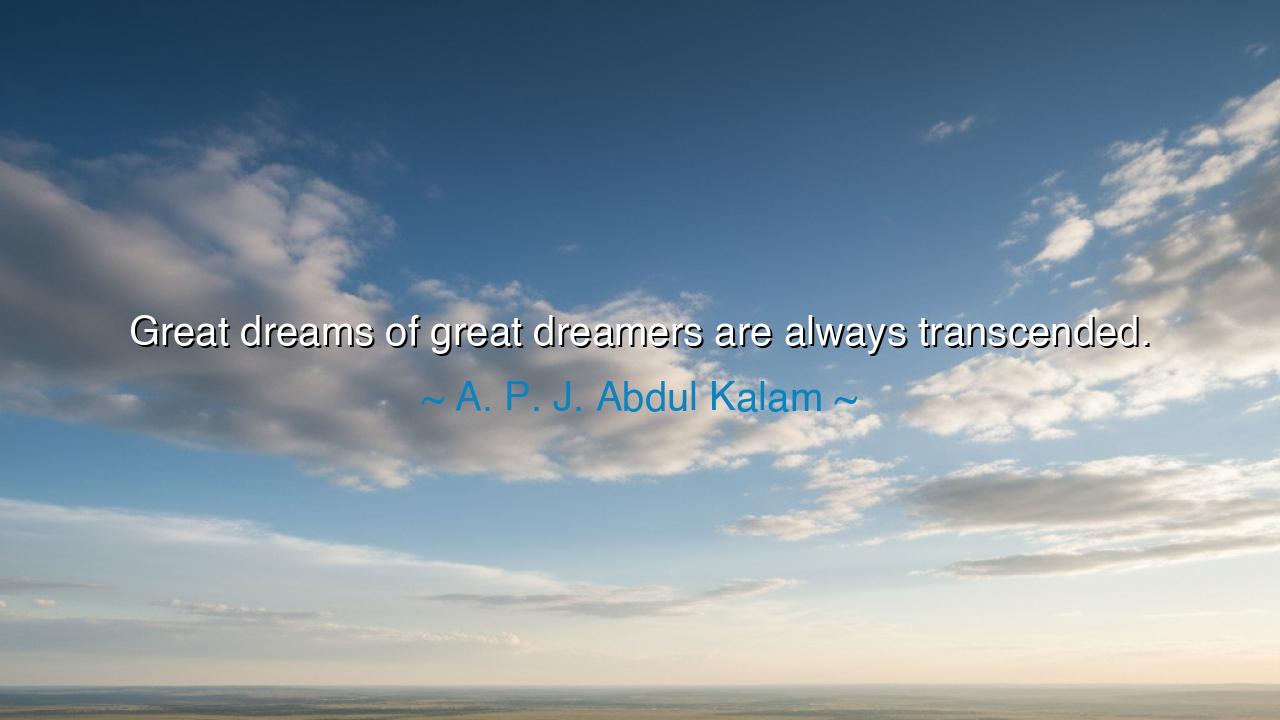
Great dreams of great dreamers are always transcended.






“Great dreams of great dreamers are always transcended.” — A. P. J. Abdul Kalam
Thus spoke A. P. J. Abdul Kalam, the humble visionary of India — scientist, teacher, and President — whose words carry the rhythm of eternity. In this radiant sentence, he unveils the mystery of dreams and their divine unfolding. He reminds us that the greatest of human visions never end with their dreamers; they outlive them, they transcend them. For when a dream is truly great, it ceases to belong to one mind — it becomes the inheritance of mankind. Such dreams are not shackled to the small span of a single life; they rise, evolve, and inspire countless others to carry them further.
The origin of these words lies in the spirit of Kalam’s own life — born from the sands of Rameswaram, nurtured in simplicity, yet destined for the stars. He dreamt of an India strong in science, rich in innovation, and united in peace. Yet even he knew that the dreams he held were not his alone. He planted them like seeds in the hearts of millions, believing that every child could be a carrier of vision. His words were not the boast of achievement, but the acknowledgment of a sacred truth: that the truest dreams are larger than the dreamer, and the greatest dreamers are those who dream for others.
Throughout history, this truth has repeated itself. Leonardo da Vinci dreamt of flight, and though he never soared through the skies, centuries later, his sketches whispered to those who would build the airplane. Mahatma Gandhi dreamt of freedom through peace, and his philosophy transcended nations, inspiring civil rights movements around the world. Even the dream of Martin Luther King Jr., born from suffering and song, did not end with his death; it continued in the voices of those who marched after him. Thus, the words of Abdul Kalam are not only prophecy but pattern — the eternal unfolding of greatness through time.
For a great dream is not a fantasy. It is a force. It asks of the dreamer not comfort, but sacrifice; not vanity, but service. To dream greatly is to plant a tree whose shade you may never rest under, to begin a song whose final verse will be sung by another generation. The dreamer must labor, fail, and rise again, trusting that what he begins will one day surpass him. The transcendence that Kalam speaks of is not magic, but faith — the faith that truth and vision, once released into the world, cannot be contained. They take root in hearts unseen, in children yet unborn.
There is humility in this teaching. The ancients, too, understood it. The builders of the pyramids, the scribes of scripture, the architects of cathedrals — none lived to see their full creation, yet they worked as though eternity were their witness. They knew what Abdul Kalam taught anew: that the dream worth dreaming is the one that does not end with the dreamer’s life. For the petty man dreams only for himself, but the great dreamer dreams for humanity — and in doing so, becomes immortal.
Let this, then, be the lesson: dream not small, for small dreams perish with the dawn. Dream greatly, and let your dreams be so pure, so selfless, that others may see themselves reflected within them. Build visions that outlast your strength, and trust that others will lift the work where you fall. As Kalam taught, it is not enough to dream; one must ignite minds, for the flame of one soul can light a thousand others.
And so, my child of the future, remember: when you dream, do not ask what the world will give you — ask what you will give the world. Let your dream be like a river, flowing beyond your reach, carrying your purpose into lands unseen. For when a dream is born in truth and love, it cannot die. It will live, it will grow, it will transcend. And one day, others will look upon what you began and whisper your name — not as one who dreamed for himself, but as one whose dream became the inheritance of all mankind.






AAdministratorAdministrator
Welcome, honored guests. Please leave a comment, we will respond soon